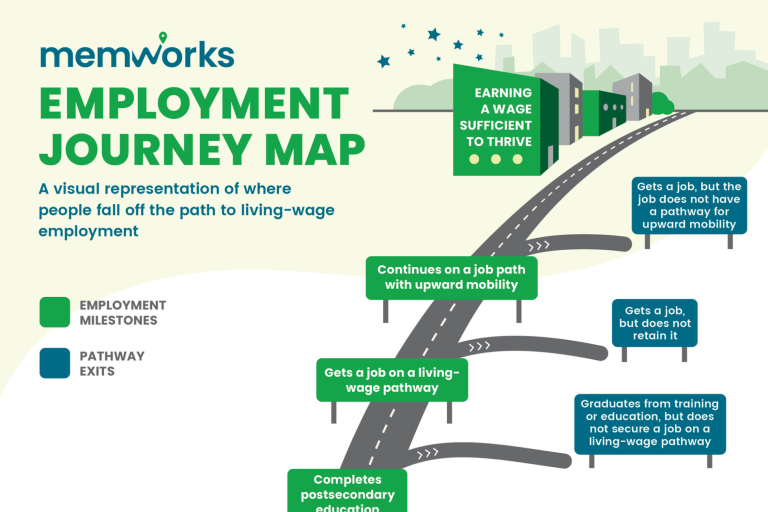Taking action alongside community partners to address some of the roadblocks that impede pathways to living-wage careers
MemWorks has helped us identify the root causes that are impeding employment pathways for Memphians experiencing poverty. We built an accurate, deep understanding of these roadblocks. The team spoke with job seekers and workforce program staff to gather first-hand perspectives. We identified and analyzed existing evidence-based solutions from across the country and evaluated their ability to make an impact in Memphis. We also took a look at the existing programming in Memphis that could be scaled to address workforce roadblocks effectively.
Armed with this knowledge, Slingshot and MDRC are collaborating with several community stakeholders to help overcome roadblocks that we are uniquely positioned to address. We cannot overcome these roadblocks on our own, however, and other workforce development stakeholders need to use the knowledge and solutions MemWorks’ has validated to address the roadblocks they are best suited to overcome. We are engaged in five action plans that have strong potential to help mitigate employment roadblocks and ease the path to living-wage careers. We’re excited to share an overview of these action plans.

Adult Academic Remediation:
Design and implement an academic remediation program to improve literacy and numeracy skills for students currently enrolled in technical training programs
We envision a community where literacy and numeracy challenges no longer prevent students from completing technical training programs and obtaining career-changing industry credentials. We’re collaborating with the Tennessee College of Applied Technology (TCAT) and HopeWorks to implement evidence-based programs that improve literacy and numeracy skills for students pursuing certifications.

Postsecondary Persistence Programs:
Enhance available student support programs for students enrolled in local postsecondary institutions to significantly increase graduation rates
Students should have the support to more easily overcome external challenges so local postsecondary graduation rates can match, if not exceed, the national average. We are engaging with tnAchieves and Southwest Tennessee Community College to enhance and refine existing programs that support students persisting to graduation.

Sector-based Strategies:
Develop an evidence-based model to coordinate efforts across stakeholders within high-wage, high-demand sectors to comprehensively enable pathways into living-wage careers
Memphians experiencing poverty should have clear pathways to living-wage careers and upward mobility that meet employers’ needs within the high-demand, high-wage sectors in Memphis. We’re working alongside the Memphis Medical District Collaborative (MMDC) to help further enhance its sector-based strategy for healthcare and create a replicable sector model that can be applied to Memphis’ other high-demand, high wage sectors.

Centralized Workforce Intermediary:
Establish a centralized workforce intermediary to align the various workforce stakeholders (e.g., employers, training providers, etc.) and improve employment outcomes
We envision workforce organizations collaborating efficiently and effectively to make workforce development services easy to access and user-friendly to navigate. We’re collaborating with The Collective Blueprint and the Greater Memphis Chamber to explore how we can establish an effective central workforce intermediary in Memphis.

Career Academy Best Practices:
Support the implementation of evidence-based practices to improve academic and long-term employment outcomes for career academy students
K-12 students need streamlined pathways to earn valuable industry credentials and obtain jobs enabled by technical training with employers in Memphis’ high-demand, high-wage sectors. We’re engaging with the soon-to-launch Tennessee Career Academy and local funders to enhance the career academy model through the adoption of evidence-based practices that will improve academic outcomes and long-term career outcomes.
Systemic change takes time, and we are at the early stages of pursuing these action plans and working towards breaking down employment roadblocks for Memphians. We anticipate these plans will evolve over time, but we are committed to helping Memphians experiencing poverty access living-wage careers that provide pathways out of poverty. We look forward to sharing updates about these action plans as they progress, and welcome your outreach if you would be interested in participating in any of them.





